
Musician JARED GELMAN
Photographs and interview by DAVID-SIMON DAYAN
Styled by ERIC SMITH
Makeup by ZAHEER SUKHNANDAN
DAVID-SIMON DAYAN: Hi honey, let’s begin with an introduction. Jared Gelman, musician, performer, free spirit. Where do you call home?
JARED GELMAN: I was born and raised in New Jersey, right outside of Manhattan. Currently, I live in Los Angeles.
DAVID-SIMON DAYAN: When you first moved to Los Angeles a few months ago, what were your expectations?
JARED GELMAN: I actually moved here without many expectations. I didn’t have too many friends, nor did I know what my day-to-day was going to look like. All I knew was that I needed to move away from where I felt comfortable; in LA, the biggest of dreams are considered more tangible. On my more confident days, I had visions of me walking out of LAX and getting paparazzi’d (I’m not famous, but sometimes you have to manifest your future, ya know?) Nothing here feels far-fetched, so it puts me in a headspace where anything is possible.
DAVID-SIMON DAYAN: Our environment does play an enormous role in our perspective, but it’s funny to hear you felt that way coming from another creative hub. When did you realize you wanted to be a musician?
JARED GELMAN: I have always felt like a performer. I started off as a dancer, and from my personal experience with coming to terms with my identity, I knew I always had a story to tell. Music was the perfect middle ground. It’s a universal language. By the time I was in high school, I knew that I needed to start taking it seriously, because it was a way I could incorporate all my favorite creative aspects into one.
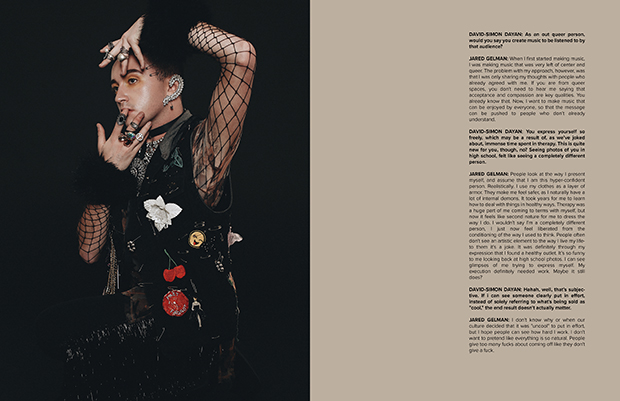
DAVID-SIMON DAYAN: Although I’ve had the honor of hearing your music, most people haven’t gotten the chance to yet. How would you describe it?
JARED GELMAN: At its core, it’s pop music. That being said, I try to maintain a campy, fun, and somewhat underground spirit. I want to be subversive while still reaching other audiences. I love playing with different genres, and a lot of the time, I intentionally do things stylistically that maybe don’t make sense to passive music listeners. The goal is to gradually take my sound in a direction that’s much more digestible.
DAVID-SIMON DAYAN: Do you feel as though making it more digestible might diminish some of its campy, subversive characteristics, though?
JARED GELMAN: If something is subversive and campy at its core, I think that will be apparent, no matter how it’s dressed up or disguised. If more people are drawn in initially, as long as they’re exposed to the same message, that’s okay. You could put me in a suit and tie, with a girl on my arm, and the straights would probably still smell an impostor in their midst.
DAVID-SIMON DAYAN: As an out queer person, would you say you create music to be listened to by that audience?
JARED GELMAN: When I first started making music, I was making music that was very left of center and queer. The problem with my approach, however, was that I was only sharing my thoughts with people who already agreed with me. If you are from queer spaces, you don’t need to hear me saying that acceptance and compassion are key qualities. You already know that. Now, I want to make music that can be enjoyed by everyone, so that the message can be pushed to people who don’t already understand.
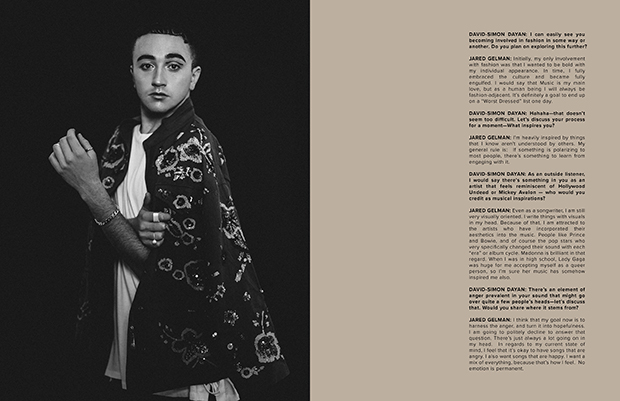
DAVID-SIMON DAYAN: You express yourself so freely, which may be a result of, as we’ve joked about, immense time spent in therapy. This is quite new for you, though, no? Seeing photos of you in high school, felt like seeing a completely different person.
JARED GELMAN: People look at the way I present myself, and assume that I am this hyper-confident person. Realistically, I use my clothes as a layer of armor. They make me feel safer, as I naturally have a lot of internal demons. It took years for me to learn how to deal with things in healthy ways. Therapy was a huge part of me coming to terms with myself, but now it feels like second nature for me to dress the way I do. I wouldn’t say I’m a completely different person, I just now feel liberated from the conditioning of the way I used to think. People often don’t see an artistic element to the way I live my life – to them it’s a joke. It was definitely through my expression that I found a healthy outlet. It’s so funny to me looking back at high school photos. I can see glimpses of me trying to express myself. My execution definitely needed work. Maybe it still does?
DAVID-SIMON DAYAN: Hahah, well, that’s subjective. If i can see someone clearly put in effort, instead of solely referring to what’s being sold as “cool,” the end result doesn’t actually matter.
JARED GELMAN: I don’t know why or when our culture decided that it was “uncool” to put in effort, but I hope people can see how hard I work. I don’t want to pretend like everything is so natural. People give too many fucks about coming off like they don’t give a fuck.
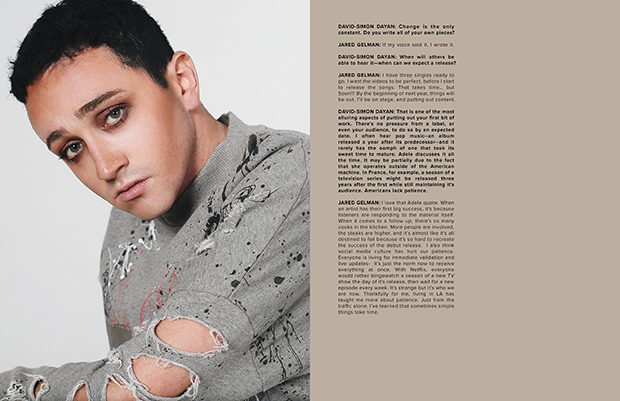
DAVID-SIMON DAYAN: I can easily see you becoming involved in fashion in some way or another. Do you plan on exploring this further?
JARED GELMAN: Initially, my only involvement with fashion was that I wanted to be bold with my individual appearance. In time, I fully embraced the culture and became fully engulfed. I would say that Music is my main love, but as a human being I will always be fashion-adjacent. It’s definitely a goal to end up on a “Worst Dressed” list one day.
DAVID-SIMON DAYAN: Hahaha—that doesn’t seem too difficult. Let’s discuss your process for a moment—What inspires you?
JARED GELMAN: I’m heavily inspired by things that I know aren’t understood by others. My general rule is: If something is polarizing to most people, there’s something to learn from engaging with it.
DAVID-SIMON DAYAN: As an outside listener, I would say there’s something in you as an artist that feels reminiscent of Hollywood Undead or Mickey Avalon — who would you credit as musical inspirations?
JARED GELMAN: Even as a songwriter, I am still very visually oriented. I write things with visuals in my head. Because of that, I am attracted to the artists who have incorporated their aesthetics into the music. People like Prince and Bowie, and of course the pop stars who very specifically changed their sound with each “era” or album cycle. Madonna is brilliant in that regard. When I was in high school, Lady Gaga was huge for me accepting myself as a queer person, so I’m sure her music has somehow inspired me also.
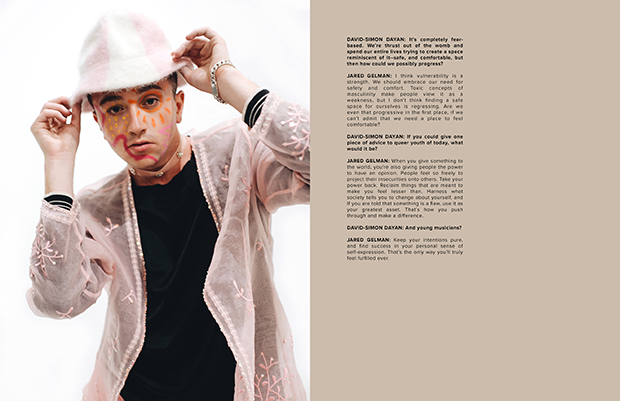
DAVID-SIMON DAYAN: There’s an element of anger prevalent in your sound that might go over quite a few people’s heads—let’s discuss that. Would you share where it stems from?
JARED GELMAN: I think that my goal now is to harness the anger, and turn it into hopefulness. I am going to politely decline to answer that question. There’s just always a lot going on in my head. In regards to my current state of mind, I feel that it’s okay to have songs that are angry. I also want songs that are happy. I want a mix of everything, because that’s how I feel. No emotion is permanent.
DAVID-SIMON DAYAN: Change is the only constant. Do you write all of your own pieces?
JARED GELMAN: If my voice said it, I wrote it.
DAVID-SIMON DAYAN: When will others be able to hear it—when can we expect a release?
JARED GELMAN: I have three singles ready to go. I want the videos to be perfect, before I start to release the songs. That takes time… but Soon!!! By the beginning of next year, things will be out. I’ll be on stage, and putting out content.

DAVID-SIMON DAYAN: That is one of the most alluring aspects of putting out your first bit of work. There’s no pressure from a label, or even your audience, to do so by an expected date. I often hear pop music–an album released a year after its predecessor–and it rarely has the oomph of one that took its sweet time to mature. Adele discusses it all the time. It may be partially due to the fact that she operates outside of the American machine. In France, for example, a season of a television series might be released three years after the first while still maintaining it’s audience. Americans lack patience.
JARED GELMAN: I love that Adele quote. When an artist has their first big success, it’s because listeners are responding to the material itself. When it comes to a follow up, there’s so many cooks in the kitchen. More people are involved, the steaks are higher, and it’s almost like it’s all destined to fail because it’s so hard to recreate the success of the debut release. I also think social media culture has hurt our patience. Everyone is living for immediate validation and live updates- it’s just the norm now to receive everything at once. With Netflix, everyone would rather bingewatch a season of a new TV show the day of it’s release, then wait for a new episode every week. It’s strange but it’s who we are now. Thankfully for me, living in LA has taught me more about patience. Just from the traffic alone, I’ve learned that sometimes simple things take time.
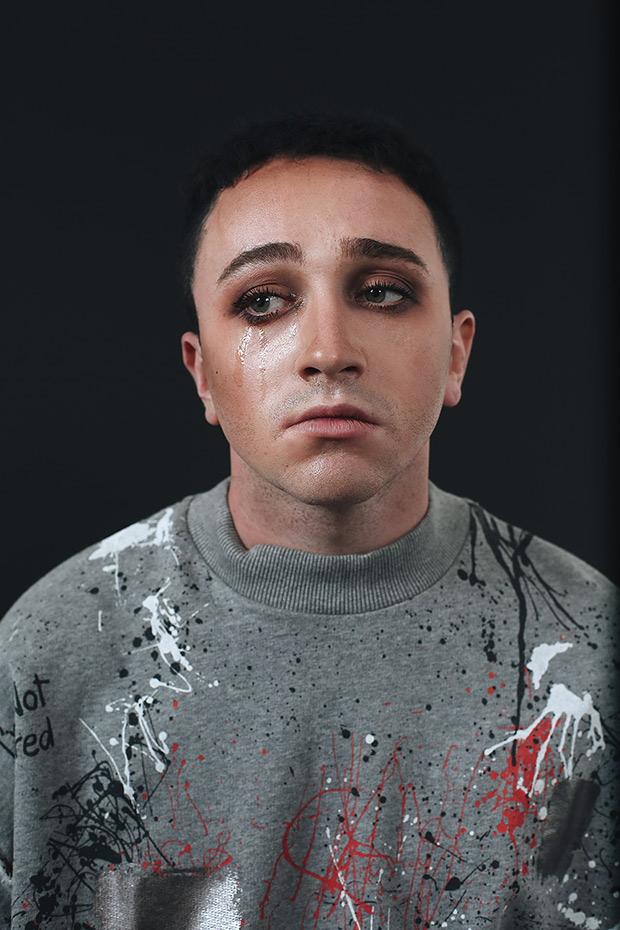
DAVID-SIMON DAYAN: It’s completely fear-based. We’re thrust out of the womb and spend our entire lives trying to create a space reminiscent of it – safe, and comfortable, but then how could we possibly progress?
JARED GELMAN: I think vulnerability is a strength. We should embrace our need for safety and comfort. Toxic concepts of masculinity make people view it as a weakness, but I don’t think finding a safe space for ourselves is regressing. Are we even that progressive in the first place, if we can’t admit that we need a place to feel comfortable?
DAVID-SIMON DAYAN: If you could give one piece of advice to queer youth of today, what would it be?
JARED GELMAN: When you give something to the world, you’re also giving people the power to have an opinion. People feel so freely to project their insecurities onto others. Take your power back. Reclaim things that are meant to make you feel lesser than. Harness what society tells you to change about yourself, and if you are told that something is a flaw, use it as your greatest asset. That’s how you push through and make a difference.
DAVID-SIMON DAYAN: And young musicians?
JARED GELMAN: Keep your intentions pure, and find success in your personal sense of self-expression. That’s the only way you’ll truly feel fulfilled ever.
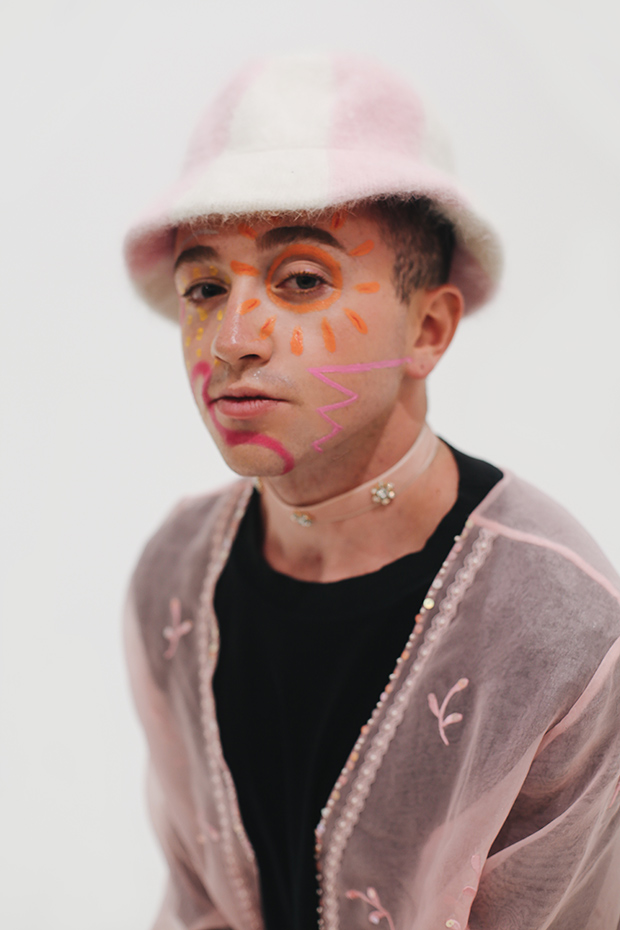
See some of the images on print
VGXW Magazine November 2017 Book 2 is available via Blurb and MagCloud
By VGXW by Virtuogenix in November 2017
80 pages, published 11/15/2017


